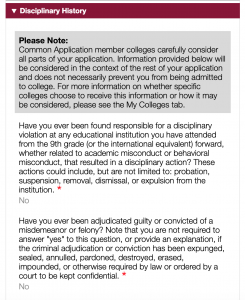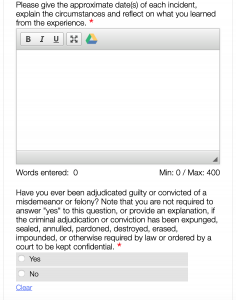June Action Plan – By Grade

Juniors:
- It might seem like a silly piece of advice, but many students are not aware that each school has a set of application instructions that are not located on the actual online application. I suggest you read them before tackling the application process.
- As you begin your essay work, open a Common App account, and begin filling out the base data (Profile, Family, Education, Testing, Activities). Unlike in past years, if you open up an account now, it will not be deleted before August 1, 2019. There is no better time than now to get your CA base data underway.
- If you’ve finished testing, it is time to review your college list and application strategy. Pinpointing your top 5 or so schools now can help you maximize your time over the summer doing research and outreach.
- If you are not finished testing, continue to prep.
- If you have summer college visits planned, take advantage of the summer slowdown, and prepare meetings with your department of interest ahead of time. Interview if possible, too. You should always prepare for interviews, even if a school states they are not evaluative. Extended research and outreach can make a big difference in your admissions outcomes.
- Many colleges don’t proactively ask for online resources yet, but you may have an interest in creating a digital portfolio (LinkedIn, SoundCloud, personal website, and/or blog). If you do, aim to complete it over the summer.
Sophomores:
- Continue working on your resume.
- Come up with a plan for test prep. Summer before junior year is a great time to begin test prep! Here are a few resources to get you started if you are not quite ready to work with a tutor 1:1: = PSAT, ACT, SAT, SAT on Khan.
- Thinking about how to explore your academic interests this summer? I hope so! There are tons of options, and you should be doing something “academic” this summer if possible. Please note: something “academic” is not limited to a class or formal academic program. Examples of ways you can explore your interests at any time of the year = Khan Academy, Coursera or edX, Ted Talks or Ted-Ed.
- Volunteer work is also always beneficial. It can be helpful to choose a few volunteer engagements and stick with them through high school/12th grade, so try to pinpoint something you will enjoy and plan to stick with it.
Freshmen:
- Continue working on your resume.
- Explore your academic interests this summer! If you are unsure what they are, that’s even more reason to get out there and do some exploring. Figuring out what you do not like is often just as important as figuring out what you do like. Please note: something “academic” is not limited to a class or formal academic program. Examples of ways you can explore your interests at any time of the year = Khan Academy, Coursera or edX, Ted Talks or Ted-Ed.
- Volunteer work is also always beneficial. It can be helpful to choose a few volunteer engagements and stick with them through high school/12th grade, so try to pinpoint something you will enjoy and plan to stick with it.
*Stay in the know! Subscribe for news, tips, and advice*







